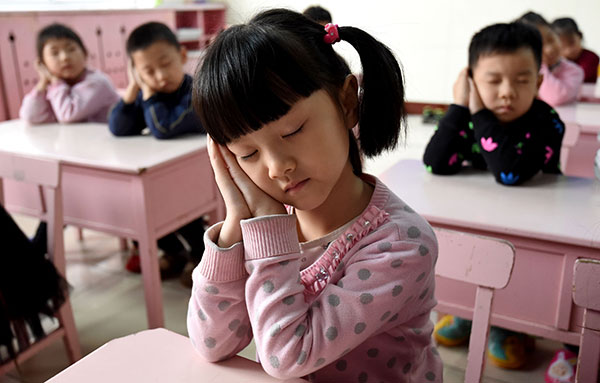 |
|
Children practice sleeping techniques at a kindergarten in Handan, Hebei province, on Monday, World Sleep Day. The day was launched by the International Foundation for Mental Health and Neuroscience in 2001. HAO QUNYING/CHINA DAILY
|
People living in small cities generally enjoy better sleep than those in larger ones in China, and negative emotions are the biggest contributor to sleep disorders, according to a report released ahead of World Sleep Day, which fell on Monday.
The China Sleep Quality Index 2016, released at the weekend by consultant firm Dataway, together with a leading mattress producer, Sleemon, also showed that negative emotions were a major obstacle to quality sleep for people in China.
The research was based on feedback between January and March to online questionnaires sent to netizens in 30 provinces, municipalities and autonomous regions, Dataway said.
Those surveyed had an average sleep index of 69 out of a possible 100, indicating an overall gap in the quality of sleep for Chinese people, the report said.
The sleep index was based on seven subindices, including the ability to fall asleep quickly, the ability to have regular sleeping hours and the ability to control emotions.
Respondents scored 49.3 in their ability to control emotions, ranking the lowest of all seven subindices, which means negative emotions were the biggest contributor to bad sleep, the report said.
The report also showed that residents of bigger cities in general had slightly worse sleep. Residents in first-tier cities such as Beijing, Shanghai and Guangzhou averaged 67.2 in the index, while those in middle-sized and small cities averaged 70.4, the report said.
Of all provincial capitals, Nanjing in East China's Jiangsu province, ranked highest at 71.4, while Hohhot in North China's Inner Mongolia autonomous region ranked lowest at 65.5.
The report also showed that freelancers and salespeople were among the professionals that have the longest sleep on working days averaging 8.3 hours, while newspaper journalists sleep 7.5 hours per workday, the shortest of all 18 major professions covered in the survey.
Sleep disorders have become a worldwide problem and affect more than a third of Chinese people, said Zhang Guoping, a doctor in the neurology department at Beijing Shijitan Hospital.
"Many factors, such as heavy work pressure, negative emotions and excessive use of electronic products at night, can cause sleep disorders," Zhang said.
"Insomnia can cause harm to health, including memory loss, and long-term insomnia suffers are three to four times more likely to suffer depression than those without insomnia," he said.
Health problems such as heart disease, as well as negative emotions-tension and fear-also cause sleep disorders. Serious suffers are advised to seek medical treatment, he said.
By WANG XIAODONG (China Daily)
Using WeChat? Scan QR Code or Press the Fingerprint Below ↓
--- (Or ADD WeChat ID: OKOKOKOKnet)
